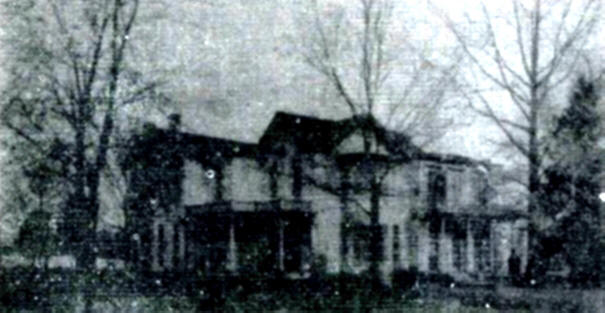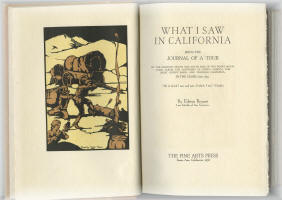Edwin H. Bryant
(1805-1869)
First Owner of Oaklea

The original Oaklea, built 1857, burned 1905
According to Land of the Little Colonel, privately published by Mrs. John S. (Katie) Smith in 1974, Oaklea’s first owner was journalist and author Edwin H. Bryant.
The son of Ichabod and Silence Bryant, Edwin Bryant was born in 1805 around Bridgewater, Massachusetts. The family migrated to Kentucky and Bryant embarked on a career in journalism. According to the University of Kentucky’s Kentucky Journalism Hall of Fame, he “…was a major figure in the establishment of the Lexington Observer and Kentucky Reporter in 1832. The two papers later became the Lexington Observer and Reporter, of which Bryant was the first editor. He also was associated with the Lexington Intelligencer…”
The Directory of the City of Lexington and County of Fayette for 1838 and 1839, lists him as the editor and proprietor of the “Lexington Intelligencer,” newspaper, with offices on Hunt’s Row. Writing may have come naturally to him, as he was a cousin of the William Cullen Bryant, also a journalist and a Romantic poet (“Thanatopsis”) as well.
During his years in Lexington, he became close friends of Senator Henry Clay. At some point, he arrived in Louisville, where he was associated with The Louisville Dime.
Citing poor health, Bryant left Louisville on April 18, 1846 to head West for the more salubrious climes of California. In Independence, Missouri, he met up with William H. Russell, another friend of Henry Clay, and the two men joined a large wagon train that included the Donner Party. The Donners were following the route proposed in Lansford W. Hastings’ Emigrants Guide to Oregon and California, which stated, “The most direct route, for the California emigrants, would be to leave the Oregon route, about two hundred miles east from Fort Hall; thence bearing west southwest, to the Salt Lake; and thence continuing down to the bay of San Francisco, by the route just described.”
On June 27, the wagon train camped at Fort Bernard, where a mountain man named James Clyman warned the Donners to Hastings’ avoid Hasting’s cutoff and stick to the main road. While the Donner party tragically decided not to heed Clyman’s advice, Bryant, Russell and seven other men did. The traded their wagons and horses for mules and reached Sutter’s Fort on September 1, 1846.
Bryant stayed in California until June 1847, venturing as far south as San Diego and returning to San Francisco, where he briefly served as alcade (a commander of a castle or fortress among the Spaniards, Portuguese, and Moors/mayor). Today, there is a street named for him in downtown San Francisco.
 During his travels he kept a journal, and after returning East with Gen. Stephen W. Kearny’s party, wrote a book entitled What I Saw in California, which was published by D. Appleton and Co. in early 1848. The book included a sensational account of the Donner Party, as well as valuable information about the route and necessary supplies and provisions. When gold was discovered in California, D. Appleton and Co. rushed to reprint the book, adding supplementary maps and information about the gold discovery and mines. The book became a best seller and was regarded as one of the most reliable of the overland guides available.
During his travels he kept a journal, and after returning East with Gen. Stephen W. Kearny’s party, wrote a book entitled What I Saw in California, which was published by D. Appleton and Co. in early 1848. The book included a sensational account of the Donner Party, as well as valuable information about the route and necessary supplies and provisions. When gold was discovered in California, D. Appleton and Co. rushed to reprint the book, adding supplementary maps and information about the gold discovery and mines. The book became a best seller and was regarded as one of the most reliable of the overland guides available.
Bryant revisited California in 1849 and then returned to settle in Pewee Valley, where he built Oak Lea and “hosted many a gay party,” according to Smith’s “Land of the Little Colonel.” California real estate investments, as well as royalties from What I Saw in California, provided ample funds for a life of leisure. In 1869, he made another brief visit to California, but after his return, committed suicide by jumping from a Louisville hotel window on December 16, 1869. The December 17, 1869 “Courier-Journal” carried the following story about his “shocking death” and also sung his praises as a journalist and man:
A SHOCKING DEATH
Fall of Judge Edwin Bryant from the Third Story of the Willard Hotel.
The city was shocked yesterday by the announcement of the sudden and terrible death of Judge Edwin Bryant. Judge B. lived in Pewee Valley, but, suffering from bad health came to the city about three weeks ago and placed himself under the treatment of his physician. He was staying at the Willard Hotel, and occupied room No. 31 on the third story. Yesterday morning about half-past six o’clock while his servant was absent from the room, and while, it is supposed, he was laboring under a fit of temporary insanity, he got out of his bed, and, opening the window, jumped out, falling to the pavement below, in the backyard, a distance of fifty or sixty feet. He was severely bruised internally by the fall, and lived no more than half an hour afterward.
Judge Bryant was sixty-two years of age. He was at one time editor of the Intelligencer, a prominent Whig paper in Lexington, Kentucky, and in 1835 became associated with Mr. Haldeman in the editorial management of the Louisville Courier, which position he relinquished, however, at the expiration of a year when he undertook a trip across the plains to California in company with Col. R. T. Jacob, Mr. Robert Ewing, Mr. E. A. Bryson and one or two other gentlemen. On his way across the plains the war with Mexico broke out, and after his arrival at San Francisco he was made an Alcade by General Kearney. Judiciously investing his funds to property in the city, it became very valuable, and gave him ample means during the remainder of his life to cultivate his literary tastes and devote himself to the hospitality for which he was noted, and which he accomplished so gracefully and liberally. Returning from California, he wrote and published “What I Saw in California,” a book which had a great run and large popularity. He purchased a residence in Pewee Valley about the year 1953, where he has ever since resided, with the exception of intervals spent in the city. The funeral will be taking place from Christ’s church this afternoon. The notice will be found elsewhere.
The writer of this became intimately acquainted with Judge Bryant nearly forty years ago, the latter being editorially associated with him for a few months at this time. Judge B. manifested ready and striking ability in writing and in whatever he undertook. Not withstanding his youth, he made his mark, strong, and broad, and deep, in the stormy politics of the period. He was alike vigorous and conscientious as an editor. He never, for the sake of achieving an advantage over an antagonist, said what he did not believe. All that he said and did was luminous with the soul of truth. He cared more for his honor than his own life. He combined all the highest qualities of manhood with the simplicity and earnestness of a child. His heart was a gushing fountain of kindness, gentility and affection. Its flowers were lovely and beautiful, nothing unpure lurking among them. The tendril of his love twined around every worthy thing within his reach. He was generous and even profuse in his benefactions. He never turned away from a petition for relief without lightening his own purse and the heart of the petitioner. Endowed with wealth, he freely gave of his abundance. To him it was indeed more blessed to give than to receive. He never forgot in prosperity a favor done him in adversity or neglected to render it back four-fold. It was ever his aim to do good, and he lost no opportunity doing it. He was one fo the bravest of living men, but dangerous only to aggressors against himself or his friends or the community. He accepted the companionship only of the virtuous, the high-hearted and the true. No human being ever entertained a deeper scorn and loathing than he for the mean, the vile and the low, whether in men or in actions. He was perhaps too sensitive for this world; the chords of his sould may have been too finely attuned for the tough fingers of the demons of the storms of human life, but he has gone where only the airs of Eden will be breathed around him. If earthly congratulations may enter the paradise of God, accept ours, oh departed friend.
Bryant’s will was written on October 13, 1869, several months before he committed suicide and a codicil was added a few weeks later. The will is on file at Metro Hall in downtown Louisville and reads as follows:
Louisville, Ky Oct. 13, 1869
Being of sound mind and body and fully conscious of my affairs I hereby revoke all wills I have heretofore made and dictate this to be my last will and testament. First I do hereby will and bequeath to Mrs. Nanette B. Smith the sum of five thousand dollars. Second, I do also give and bequeath to Mrs. Nanette Smith the sum of five thousand dollars. Thirdly, after my just debts are paid, I give and bequeath to my lawful heirs all the remainder of my fair property and to carry out my wishes. I hereby appoint Ira P. ? to be my executor to carry out the above will and that he not be bound to give any security for the trust. Witness my hand this day above written.
Edwin Bryant
Louisville, Ky. November 1, 1869
I hereby add to this as a codicil to my will above written. I also give and bequeath to E? M? and to Nanny McDowell(NOTE: She was Nanette B. Smith’s orphaned cousin once removed by her cousin Henry Clay, Jr.) each one thousand dollars and in all other respects confirm my will as above written as witness my hand.
Edwin Bryant